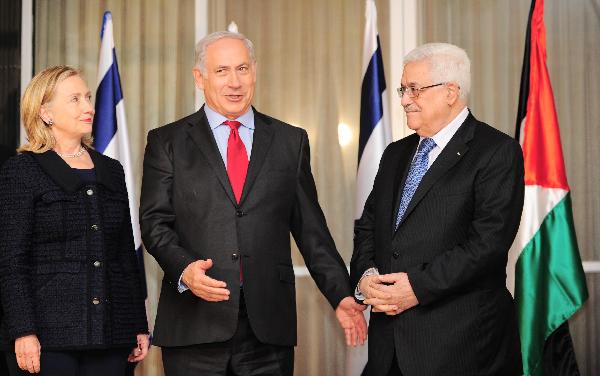Israeli-Palestinian direct talks go with good signs
 |
|
U.S. Secretary of State Hillary Clinton, Israeli Prime Minister Benjamin Netanyahu and Palestinian President Mahmoud Abbas (from L to R) hold talks in Jerusalem, Sept.15, 2010. [Xinhua/Yin Dongxun] |
The Israeli-Palestinian peace talks seem to show certain signs of momentum as leaders of the two sides held discussions on core issues on Wednesday for the second day after their Tuesday's meetings.
After Wednesday's trilateral talks, U.S. Middle East peace envoy George Mitchell said Israeli and Palestinian leaders have agreed to continue their direct talks next week.
Analysts say the intensity of these talks provides some positive indicators that parties of the peace talks including the United States, aim to make some progress in resolving the decades- old conflict and realizing lasting peace in the region.
The bases which can render the negotiations a success " apparently" exist, said Fakhry al-Tahtawy, a professor of international relations at Cairo University.
"We cannot predict what happens behind, because what happens behind is completely different from what is announced and this represents a guarantee for the negotiators not to be exposed to outside pressures," he said.
The analyst, optimistic about this round of talks, said the U.S. is keen this time to give impetus to the direct negotiations.
Under the U.S. mediation, face-to-face talks between Israel and the Palestinians resumed on Sept. 2 in Washington, after a hiatus of 20 months.
On Tuesday, Israeli Prime Minister Benjamin Netanyahu and Palestinian President Mahmoud Abbas held "serious discussions on core issues" in the Egyptian resort of Sharm el-Sheikh, at the presence of U.S. Secretary of State Hillary Clinton.
The issues, which are key to the peace process, include borders and security, the status of Jerusalem and the return of Palestinian refugees.
Details of these discussions were not revealed.
Talks about core issues for the first time, which did not happen during the first round of talks, are a good indicator, said al-Tahtawy.
Hani Khallaf, Egypt's former assistant foreign minister said that the negotiations being moved to Jerusalem is also a good sign for improvement.
"These negotiations have started in the United States, the international sponsor and then it moved to Egypt, the regional sponsor. Now it moves to Jerusalem. This is a logic development which gives the impression that the Israeli government is serious, " he said.
Khallaf said he believed that peace is achievable within one year as expected by the U.S. administration, who will not accept the wasting of the peace opportunity this time, especially after its vow to improve relations with the Arab and Muslim world.
However, not everything is good for the talks. An Israeli moratorium on the building of settlements in the West Bank, will expire at the end of the month. The tackling of this issue will be a test for the two sides.
 0
0 







Go to Forum >>0 Comments